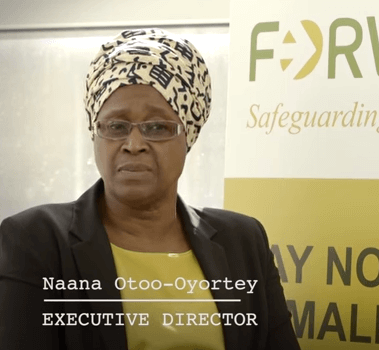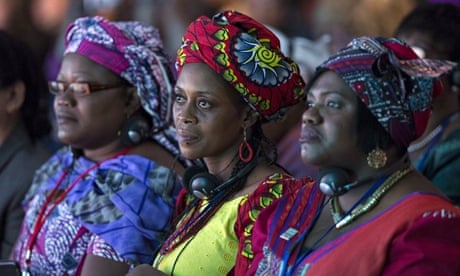Where were the grassroots voices at the Girl Summit?
Naana Otoo-Oyortey, MBE – Executive Director of FORWARD
 The global event on FGM and child marriage was a big step in the right direction, but there are still four key areas to address.
The global event on FGM and child marriage was a big step in the right direction, but there are still four key areas to address.
On 22 July, more than 600 people and much of the UK’s media gathered in London for the Girl Summit, which focused on the themes of female genital mutilation (FGM) and child, early and forced marriage.
It was great to listen to the numerous pledges, funding commitments and policy announcements, but with most delegates now gone and the media’s attention for the most part turned to other things, now is the time to reflect on the long journey to the Girl Summit.
The summit marked a turning point for FGM and child marriage campaigners. However, we need to ask ourselves whether this will lead to lasting change. Changing centuries-old social norms can only happen at community level, and to end these practices within a generation, we need to address the missing links from the Girl Summit as a matter of urgency.
1. Finance for grassroots organisations
The Department for International Development (DfiD) has committed £1m to charities to tackle FGM and child marriage at a global level. But the catch here is that access to these grants require match funding, pound for pound.
This clearly puts the grassroots organisations that are struggling at a huge disadvantage. There needs to be simpler ways to resource grassroots organisations who are desperate for funding to sustain their efforts to transform the lives of rural girls and young women.
2. Engagement with faith-based leaders
Thirty years ago my organisation FORWARD was the lone voice campaigning against FGM. Today, the taboo is lifting, the media silence on FGM has been broken and many new organisations and campaigners, particularly diaspora voices, have joined the march to end FGM.
But what was clearly needed at the summit was more visibility of faith-based leaders. For many communities a misinterpretation of religion justifies FGM, as well as child or forced marriage, so religious leaders need to be part of the solution for lasting change.
3. Connecting the dots for young female activists
The summit provided a moment for us all to be proud. We saw young people given a platform to express themselves. Many young people attended the fringe Youth for Change event, as well as the summit and brought new energy and innovation to the discussions. For two young African campaigners, both 19, both survivors of child marriage and FGM, coming to London was a life-changing experience and not completely in the ways expected.
Coming from rural communities, their journey to the summit was long and arduous at times. Firstly getting a passport required a birth certificate to prove they were citizens of Ethiopia and Tanzania respectively. But neither had birth certificates, which is not uncommon for many children born in rural areas.
The second barrier was getting their visas. This required travelling to the capital and having to borrow credit cards to pay for the privilege. Despite their excitement at being part of a global event, these stories remind us of the urgent need to back up our interest in young women’s voices with the resources needed to get those voices heard. What’s more, both girls will go back to their rural communities to face the challenges of inadequate support for girls, poor policy environment and traditional norms that do not value girls. Who will ensure that they get the sustained support they need?
4. The voice of the diaspora and community champions
Despite the presence of organisations and individuals from all over the world, there was very little visibility for diaspora and community organisations or individuals. They are the ones who have fought hard to get these issues on the agenda, when large NGOs and the British government were still silent. These are the individuals who’ve faced rejection from their communities or have described losing their jobs in order to focus on the cause. They have been portrayed mostly as victims and not survivors and agents of change.
Why does the presence of diaspora organisations matter? Because giving them a dominant role would influence how the issues are presented in the media and their own communities. Changing hearts and minds in key communities that practice these harmful traditions is the hardest but most sustainable way to help finally end the FGM and child marriage. In recognition of this, more resources need to go to the organisations working most closely with these communities. It was really upsetting that only £30,000 was allocated to community champions working on FGM in the UK.
It is exciting to see the UK government recognise how destructive these practices are and pledge to tackle them globally. Yet while there is a critical role for government intervention and support, change must come from within. If the prime minister, the development minister, DfID and the large NGOs want to see change in a generation, we urgently need for a comprehensive UK national action plan on FGM, which acknowledges the key role of community or grassroots organisations and individuals and which invests in and supports marginal voices.

